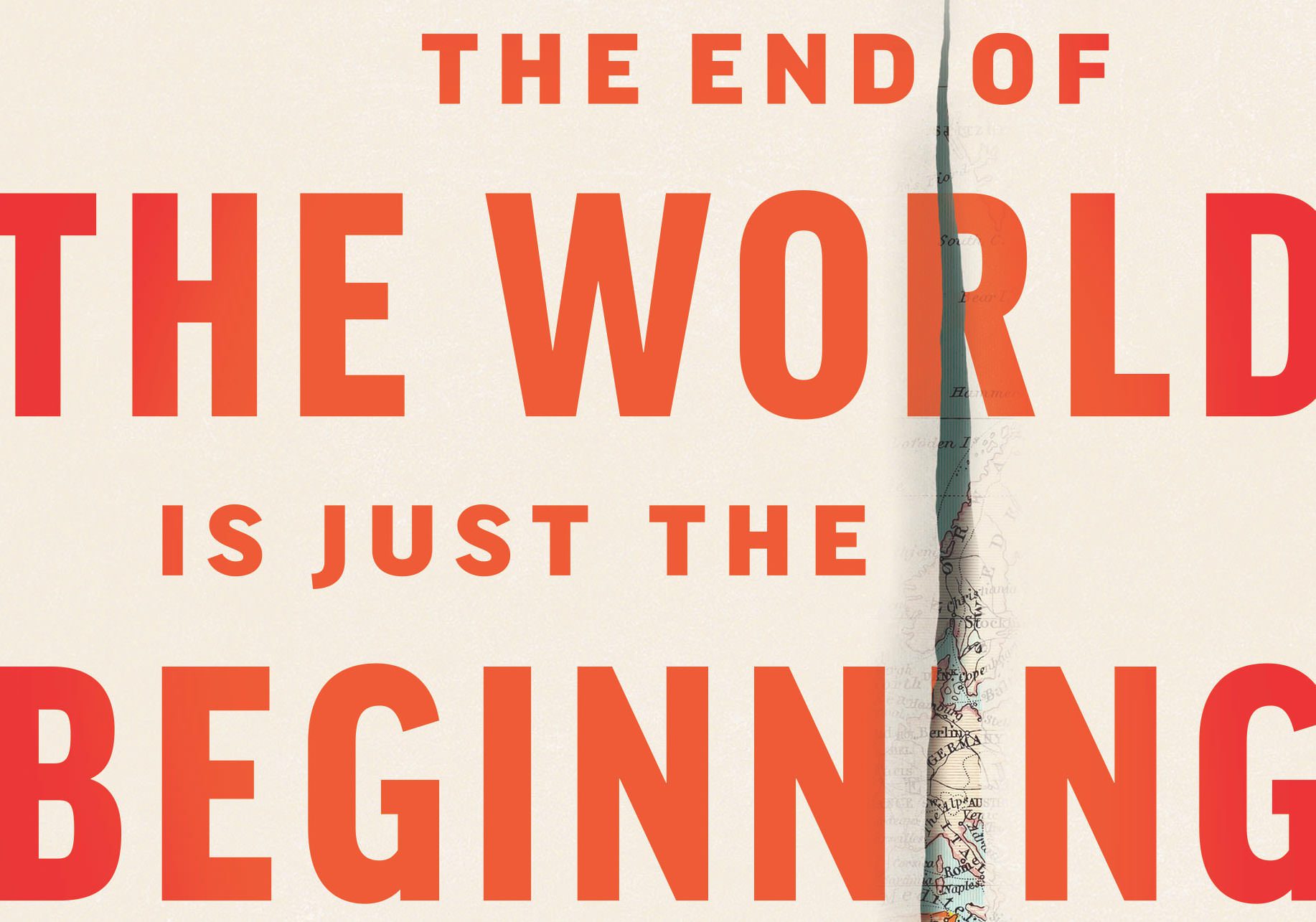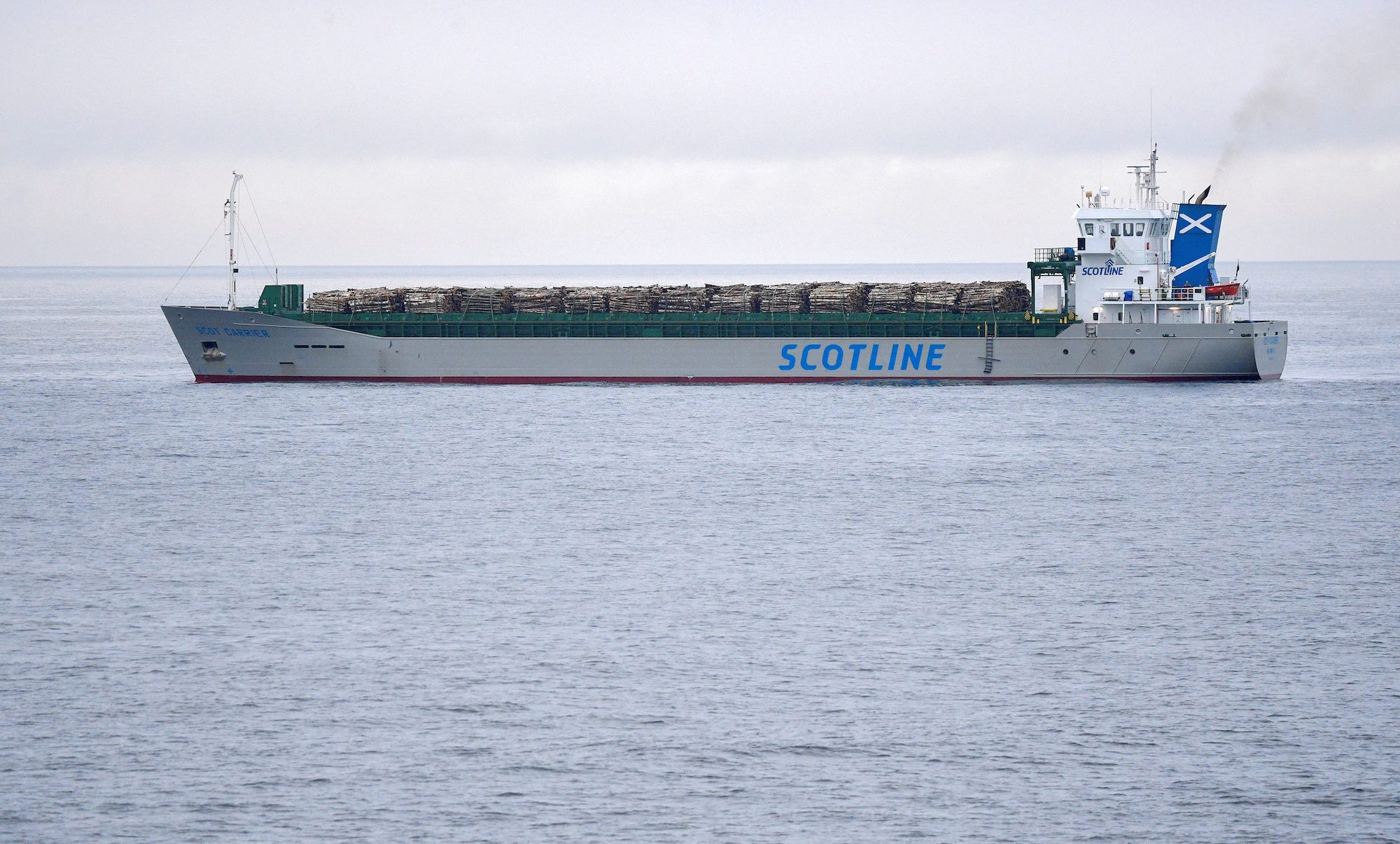by Captain John Konrad (gCaptain) There is a large shipping company that’s made record profits in recent years after changing its operational model to bet against the US Navy. Their secret weapon is an influential geopolitical strategist who claims the decline of the US Navy (and its apathy towards commercial shipping) poses the biggest threat to the world economy. Others gCaptain interviewed believe he’s just an American alarmist who uses fear to drive book sales. Who is right?
The problem for those who discount the work of Peter Zeihan, author of the new book The End Of The World Is Just The Beginning, is his bold predictions – like the Russian invasion of Ukraine, which he predicted in his 2014 book The Accidental Superpower – are coming true at an alarming rate.
Zeihan is not one to pull punches. He flat out believes the world is headed for serious trouble as it deglobalizes due to a lack of maritime leadership on the part of the United States and increasing tensions with Russia and China. He is not alone, an increasingly vocal set of influential people are warning about a changing world, what makes Peter Zeihan different is his focus on maritime security and shipping (including inland and short-sea shipping).
The Changing World Of Shipping
Besides Zeihan there are three broad categories of people who believe we are facing a changing world order with heavy seas ahead.
1 Climate Change
The first category basically states that climate change and pollution is our primary concern. These leaders typically believe globalization will continue to be driven by cheap ocean transport and low-cost financing. These are leaders with open mindsets who believe science and technology coupled with smart economic policy can provide the world with green alternatives while increasingly socially progressive policy will assure global peace. This “more of the same” outcome pervades most shipping conferences and maritime newsletters chock full of articles about green fuel alternatives, free trade, operational efficiency, and an end to regional cabotage
2 The Rise Of China
The second possible outcome for global trade is the dominance of China in the coming decades. This outcome is described in Ray Dalio’s latest book which charts the rise and fall of oceanic empires over centuries and plots out China’s growing influence and eventual rise over Pax Americana. These leaders believe in the cyclical nature of empires and they make historical connections between the fall of Rome or the collapse of the British Empire with the fall of Pax Americana. This opinion is not as popular in shipping circles but most executives agree it’s at least a possibility.
3 Deglobilization
The third possible outcome is deglobalization. Very few people in shipping talk about this (even those who believe it’s the most likely outcome). In this view, the oceans will become increasingly dangerous as regional powers fight openly with neighbors and wield integrated defense strategies – a Pentagon term for weaponizing all instruments including financial, contractual, cyber, etc – as the western world fights amongst itself or shrugs off responsibility for ocean security leading to an increase in piracy, privateering, and general chaos.
Zeihan’s latest book – The End Of The World Is Just the Beginning – is very much in the third camp. The age of globalization has made the world cheaper and faster – bits and bytes snake through subsea cables at the speed of light, smartphones bring encyclopedic knowledge to your fingertips, and the shipping container has allowed goods to be consolidated, placed aboard a ship, and transported around the world at breakneck speeds. According to Zeihan this is all coming to an end thanks, in large part, to the decline of the US Navy.
Deglobilization seems far-fetched at first. When a friend first introduced me to Peter Zeihan’s work years ago I immediately dismissed most of his assertions and lost interest… but then something strange happened. I began hearing how certain terminal operators are using his work to predict port congestion, how others have made fortunes betting on deglobalization play stocks, then I learned that executives at one of the largest and most conservative shipowners on the planet were using Zeihan’s work to transform their operational models.
Related Book: The Accidental Superpower: The Next Generation of American Preeminence and the Coming Global Disorder by Peter Zeihan
Multiple sources have confirmed to gCaptain that Zeihan’s principles are being taken seriously by a small group of very influential industry players. There is even a secret Zeihan maritime book club. Sources who are influential enough that I dropped everything and read all his books.
Those in shipping who promote Zeihan’s work say the United States turned its back on ocean policy decades ago and for a good reason. The oceans are a dangerous place but following World War II the United States made a deal with the rest of the world. If nations promised to use the US dollar as the denomination of trade and English as the lingua franca of global logistics then the US Navy would protect the shipment of goods globally. You provide the boots/butter and America will open up its markets to you and provide security at sea. And not just some seas but ALL the world’s trade routes to all the nations of the world – including to the United State’s competitors like Russia and more recently China – not openly belligerent to shipping.
Pax Americana
For three-quarters of a century from (mostly forgotten) maritime battles like the Tanker Wars of the 1980s to land wars in Korea, Iraq, and Vietnam… the United States secured corporate interests and the movement of trade globally. In addition to maritime security, the US also opened up its market to world trade along with access to financial markets and government-backed lending.
There were only a few prerequisites for a nation to succeed during globalization. You could not attack ships. You needed deepwater ports and harbors protected from natural elements plus lots of land and you needed to – preferably via Wall Street banks and consulting firms – borrow a lot of cash to invest in cranes, docks, warehouses, and intermodal transport. In addition, you needed enough flat geography to move heavy materials to population centers inland. The nations with the best navigable waterways (e.g. Germany, Japan, United States) used those waterways to generate capital and to move the heavy coal, oil, rebar, and concrete needed to invest in industrial growth. These nations had a head start but – as finance grew abundant and capital became cheap – all nations near the sea could secure loans and materials to build the infrastructure of trade and prosper. Only those nations secluded from navigable waters – e.g. Afghanistan, Chad, Mongolia, Bolivia, etc – failed to prosper (note, the high coastal bluffs and lack of coastal protection throughout most of Africa slowed investment in most of the continent).
Nearly everyone prospered and the oceans became safe for ships of immense size and slow speed, unlocking economies of scale that became possible only because the ocean became safe enough for shippers to put all their eggs – or at least 26,000 TEU’s worth of eggs – in one basket.
“In the age of globalization, everyone could get in on global access, manufacturing, and mass consumption,” writes Zeihan in a chapter titled The Americanization of Trade. “The world needed more ships to transport more products, but in a world where competition among the Imperial Centers was no longer the global environment’s defining feature, security was no longer the overriding concern. Competition was no longer about guns and sealane control, but instead about cost. This shift from security to efficiency as the predominant corporate concern meant the world didn’t simply need more ships; it also needed different kinds of ships.”
The world needed bigger ships that provided economies of scale and it needed to cut costs in other ways including slow steaming which significantly reduces fuel costs and carbon emissions but lengthens the amount of time a ship spends in hostile waters. US Naval protection eliminated hostilities which enabled companies to slow-steam an increasingly large amount of valuable cargo through historically dangerous waters. With naval protection, insurance companies could underwrite the risk at rock-bottom prices.
And it was not only just-in-time consumer goods packed in shipping containers destined for Walmart and Amazon that became cheap but the world’s supply of energy, via ULCC’s, and the materials of trade aboard bulkers. The massive amounts of copper and iron ore needed to build wind turbines, silica for solar panels, concrete to build almost everything, and more basic human essentials like food and energy. Even the rebar used in most construction projects came from the dismantling of older, smaller ships to make way for large new ones.
Everyone prospered from more efficient shipping but there was a cost paid by the one nation that did not need maritime security because it had two large oceans protecting it from would-be aggressors, was a net exporter of food and fuel, and had more miles of rivers (and protected coastal waters) than anyone other nation. One nation with an abundance of most natural resources. One of the very few nations that is not facing imminent demographic collapse. The United States of America.
The Cost Of Maritime Security
The cost to America was incredibly large, trillions upon trillions of dollars. Maintaining security at all times in all of the world’s oceans not only requires hundreds of warships, submarines, and super-carrier strike groups. It also requires naval bases placed strategically around the world. The logistical costs of maintaining dozens of permanent forward-positioned garrisons, protective airfields, fuel depots, security cutters, and America’s 911 force (Hoorah Marines) are incredibly expensive.
Maritime security has always been a hard sell to a mostly isolationist American public but lawmakers worked hard to hide the costs and eliminate all means by which the public could protest against the costs. Naval expenses were buried in joint operational spending bills. The US Maritime Administration was dismantled and the American merchant marine was allowed to rust away. Without many American ship captains or powerful American shipping executives around there simply weren’t many people with political clout or the type of media access needed to sound the alarm.
That worked for a time but no longer does for one very big reason. China.
China
China is THE one nation that has benefited the most from secure maritime trade and the Freedom Of Navigation (FON) of all merchant ships at American taxpayer expense. China is also, hypocritically, the one nation most hostile to American naval protection and freedom of navigation.
Americans are willing to pay taxes for “national security” that protects their national interest and reduces the cost of products sold by Walmart and Amazon but would hesitate to pay taxes that benefit commercial European and Asian shipowners above their own. After the death of the US Merchant Marine, however, the American public was given no alternative but to protect foreign ships. Once China started building the world’s largest shipyards, the second largest fleet of merchant ships, and the world’s largest Navy… funding global maritime security stopped making political sense.
President Trump, who many forget was Commander In Chief of all US Naval operations globally, railed against the cost of American military protection. President Biden poured gasoline on the fire when, starting last summer, he blamed foreign shipping companies for inflation.
It is not by accident that Trump’s top trade advisor dedicated his book to a US Navy intelligence officer. And it’s not by accident that Biden is openly hostile to shipping, yet few European shipping experts we talk to understand the true reasons for these hostilities.
The Book
Zeihan’s well-documented and researched book documents all of this in a manner that reads like a page-turning work of fiction. He does not hold back. He points blame directly at the US Navy and populist leaders around the world who undervalue maritime security and have given up on the longest period of ocean peace and prosperity in history.
Zeihan brilliantly weaves the collapsing demographics with changes in trade balances and populist professional leaders who have turned their back on the sea. He shows how Bill Clinton’s lack of interest in global maritime leadership began this dangerous trend and Zeihan details how the winner of every presidential election since was won by the candidate least interested in global, maritime shipping, and naval dominance (Trump did care about shipping but not for the benefit of the World Order but to protect American interests overseas). He describes the policies of authoritarian leaders like Xi and shows how petty anti-American policies by European leaders – including leaders of the EU shipping community – have taken for granted the security benefits they have received.
The apathy and atrophy of the US Merchant Marine bleed into the US Coast Guard as America turned towards inland wars in the Middle Eastern. And now that same apathy and atrophy are bleeding into the US Navy (the Navy is just not being honest about) where culture is starting to turn toxic, ships are now overtasked, decreasing in number, aging, and increasingly rust-stained.
As good as the work is, I do highly endorse reading it, Zeihan missed one critical piece to the puzzle. America has not only paid Trillions of taxpayer dollars over the decades to secure world trade but – as I have stated in my own words, above – the US, with the help of the US Maritime Administration – has also systematically dismantled its own maritime interests in the process. After decades of complaints about cabotage laws and strict regulations by European maritime leaders and business executives… the United States deregulated ocean commerce and made its own shipping companies uncompetitive and broken on purpose.
This is important because now that Russia is blockading Ukraine grain exports – and, in doing so, tilting the world towards famine and populist revolts – and while China is locking down ports and flexing its muscle in disputes with its neighbors – and Iran is boarding and arresting ships that the US Navy protected from harm for decades – and while scandals break out in major maritime exporting nations like Brazil – while even American ship captains are arrested, and while India and Indonesia and China close off exports of food and energy… as while all this is happening the US Navy shrugs. It shrugs because it has no US Merchant Marine to protect and there remains no great American shipping interests or even American shipping leaders standing up to help them correct course.
Not a single ship captain works in the Pentagon or any of the major national security think tanks. Without a US Merchant Marine asking for protection, the US Navy simply doesn’t care.
Regardless of Zeihan’s failure to dive into US Maritime Administration (MARAD) policy or American control over the United Nation’s International Maritime Organization in London – both errors of omission not commission – these do not distract from his message or meaning. Zeihan’s thick book contains several chapters to maritime transportation and these parts contain good information about our industry.
You may not agree with Zeihan’s premise even after reading the book – in my experience European shipping leaders tend to scoff at any suggestions of American exceptionalism in the maritime domain regardless of how factually accurate it is – but I still highly suggest you read it because Zeihan’s outside-the-box thinking is of clear value in a world that we all can agree is getting more chaotic and uncertain.
Conclusion
If you are among those who believe Outcome One (i.e. globalization will continue to spread and climate change is our biggest problem) is inevitable then it’s worthwhile reading Peter Zeihan’s new book simply as an antidote to confirmation biases. If you believe Outcome Two (i.e. Ray Dalio is correct that China will dominate the rest of this century) is most likely then his book will give you clues on how the United States and European Leaders may react to fight the rise of China. If, however, you believe in Option Three (i.e. that the world is now headed for deglobalization and maritime strife) you are probably already familiar with Zeihan’s previous work, have prepared your company for the Ukraine war he predicted in his 2014 book The Accidental Superpower, and are now profiting immensely.
The bottom line is that the oceans and supply lines are getting dangerous as certainty turns to a voyage in thick fog. Without the help of the US Navy, economies will collapse, famine could set in (as has been warned for months with still zero action from the US Navy in the Black Sea), and chaos could prevail. The future is not certain but new voyage plans will be required and The End Of The World Is Just The Beginning could serve as useful sailing directions.
gcaptain.com







